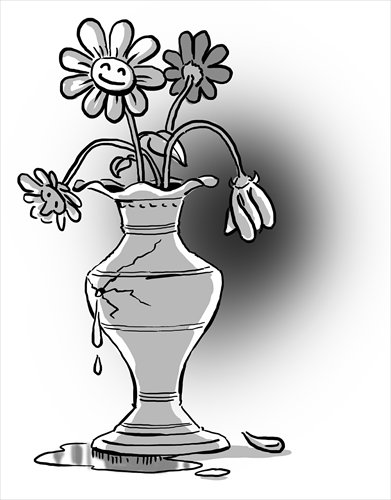Russia-West spat puts Central Asia at risk

Illustration: Liu Rui/GT
In the past months, the diplomatic standoff between Russia and the West over Ukraine has been the fixture of daily news, political commentary and blogging. While Western countries rolled out their first targeted sanctions against Moscow as early as March, it took them some time to negotiate the hard-biting economic measures, which have been in force since August.
Their result is well-known: Russia's largest banks can no longer borrow funds in the US and the EU and the country's energy and defense sectors are hence subject to significant restrictions.
Russian President Vladimir Putin's heavy-handed response to the West's ire has since consisted in a temporary ban on the imports of foods, which most Russians have endured stoically but with very little enthusiasm, if any at all. Most macroeconomic analysts predict that the Russian economy will most likely go into a recession this year.
Capital flight has intensified in the first semester, reaching $74.6 billion after only $33.7 billion in the first half of 2013. The energy industry needs further investments, but neither Rosneft nor Gazprom can now finance its ambitious projects with Western loans.
At the level of ordinary Russians, the imports ban will inevitably make many products vanish from the shelves in supermarkets, while those that will still be on sale are doomed to become more expensive.
In this context, Russia is increasingly looking eastward in search of new partnerships, so as to sustain its flagging economy and limit the negative impact of the sanctions.
Given Moscow's historical ties with post-Soviet Central Asia, the Kremlin has recently made it clear that it wishes to boost its cooperation with the region. Central Asian states themselves have been making statements of support to Russia, for instance Kyrgyzstan and Tajikistan both saying that they will increase exports of fresh fruit and vegetables.
Such gestures of goodwill on their behalf look anecdotal at best, since Russia needs much more than cheap agricultural produce from Central Asia to save its economy from a new crisis.
In fact, Russia's current problems could have severe consequences for its southern neighbors, some of whom have already started to work on eventual countermeasures.
On August 6, Kazakhstan's Minister of National Economy Yerbolat Dossayev said that in September the government may adopt unspecified measures in order to cope with a potential economic meltdown in Russia.
The deterioration of Russia's economic situation would not only compromise its bilateral trade with Central Asia, but also jeopardize the livelihoods of hundreds of thousands of labor migrants from Kyrgyzstan, Uzbekistan and Tajikistan. The latter's money transfers back home to their families represent, for instance, almost 50 percent of the Tajik GDP.
Therefore, the ongoing bickering between Russia and the West is more of a liability than an advantage for Central Asia, which will clearly be unable to fill the same niches in the vast Russian market as European and US producers.
Russia's shift from West to East lies inevitably with bigger powers, first and foremost China. This May, the two countries signed "the contract of the century" worth $400 billion. It implies that Gazprom will supply on an annual basis 38 billion cubic meters of natural gas to Beijing for the next 30 years.
In June 2013, Rosneft and CNPC already signed an oil trade contract valued at $270 billion. The Russian oil firm will thereby supply a total volume of 365 million tons of crude oil until 2039.
While Russia has recently said that India may soon create a free trade zone with the trilateral customs union comprised of Russia itself, Kazakhstan and Belarus, ties with Iran are also on the rise.
On August 5, Moscow and Tehran concluded a memorandum of understanding that concerns their future economic cooperation, especially in the field of oil and gas trade. The two countries expect to sign first commercial contracts next month. The Kremlin is thus visibly seeking to outbid its Western competitors before the last anti-Iranian sanctions are lifted.
Yet, Russia cannot disregard Central Asia, despite its marginal status as compared to China's, India's or Iran's. The forthcoming Eurasian Union, which includes Kazakhstan and may extend in the future to Kyrgyzstan and Tajikistan, is an integral part of Moscow's power game in Eurasia. And Russia must play it right.
The author is a Paris-based international affairs expert who writes for the Jamestown Foundation and the Central Asia-Caucasus Institute. opinion@globaltimes.com.cn